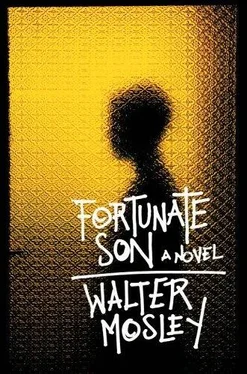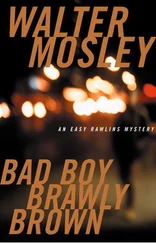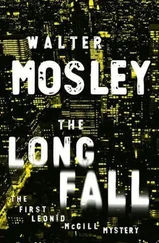One night Eric and Christie were sitting in the beach-house living room, with eleven-month-old Mona rolling and crawling on the couch between them.
Christie said, “Isn’t she beautiful?”
Eric thought, Yes, she is, though he didn’t say it.
“She’s so happy because we love her,” Christie added.
Eric wondered about love. He felt respect for his father but not anything that he’d describe as the kind of love that he’d read about in books and saw in movies. He had more feeling for Ahn, but this too was not love — it was the remnant of fear that he felt when he was just a child. The only love that he’d ever really experienced was for Branwyn and then Thomas — who in Eric’s mind was a part of Branwyn. There was something else about Thomas that Eric felt drawn to. It was a quality that Eric remembered but couldn’t quite describe; Thomas was smart or clear or maybe even unafraid. He had something that Eric lacked, but the Golden Boy (a nickname they’d given him at college) couldn’t ever say for sure what it was.
Looking upon his straw-headed, violet-eyed daughter, Eric realized that he felt delight but not the kind of love that he knew as a child.
Even with Christie, whom he slept with every night, there was no driving passion. He compared his life to the pleasant garden that Ahn would take Eric and Thomas to when they were small. There was a big lawn and stone animals for the boys to play on. But very soon Eric became bored with the pretty grass and the whimsical creatures. He remembered that it was only Thomas who made those days bearable.
Thomas would talk to the animals, and they would tell him stories about what happened at night when all the people were gone. When the lawn became dark, the elephant battled the lion. Every night they fought and roared, baring claw and tusk, Thomas said in his breathless whisper, but no one could see them because no one was allowed in the children’s park after sunset.
At that moment Eric could see Thomas standing there in the middle of the broad lawn while Ahn sewed on the parents’ bench, chatting with the other domestics.
Eric recalled a day when he and Thomas were on top of the elephant, the largest animal in the menagerie. Thomas had raced Eric to the top, and for the first time the smaller boy won. But when he got up there he slipped on the slick head and fell to the ground below with a loud thump. Eric asked his brother if he was okay, but Thomas didn’t even cry. It wasn’t until the next morning that Branwyn noticed the swelling on his leg and took him to the emergency room.
“Eric. Eric,” Christie was saying.
“What?”
“I was talking about Mona. Don’t you care about her?”
“Sure I do. Of course.”
“Then why don’t you ever tell her that you love her?”
Because I want her to be safe, he thought. But he said, “I tell her all the time; it’s just that I do it when we’re alone.”
After a year Eric moved his family into special university housing that UCLA initiated for their younger students with children. One day he got the letter in the mail. The school took the top three floors of one of the fancy buildings on Wilshire, the Tennyson, for this experiment. Eric was chosen.
The apartment was a seven-room penthouse that looked out over a great part of L.A., even as far as the ocean. The rent was less though not quite enough less for Christie to quit her job.
But when the university was processing his papers for the apartment, they realized that Eric was now an independent minor no longer claimed by his father. A kindly clerk in the Student Housing Department felt sorry for the young father and passed his information along to the Financial Aid Office, where she knew there was a special stipend program for needy students with no other financial support.
Eric began to receive monthly checks instead of the rent bill, and all tuition expenses were taken on by the taxpayers of California. Christie enrolled in school, and the university provided full day care for Mona.
It was now Christie’s dream to become a doctor. She enrolled as a pre-med major at UCLA.
The next three years passed without incident. Anyone looking at Eric and Christie’s life together would have thought it was just about perfect. Eric rarely got sick, but whenever he did he stayed away from home, telling Christie his fear of making Mona ill. He never confessed that he was the cause of the deaths of both his mothers because of some insane fortune that allowed him to survive while others around him died.
He would usually stay in a motel down by the beach when he got ill. But during his last infection he stayed at a fellow classmate’s parents’ guesthouse in Bel-Air. The student was named Michael Smith. The guesthouse was rarely used, and Michael liked having Eric around because Eric was commonly acknowledged as the best undergraduate student in the Economics Department. Eric remained in isolation during the infectious period, but he promised to help Michael with his work once he’d recovered.
Eric liked Michael. He was a slender, anemic-looking young man with brown eyes, brown hair, deeply tanned skin, and almost no apparent personality. His mother had died delivering his sister, Raela Timor. His father, Ralph, remarried and then, soon after, died because of a freak aviation accident.
The accident had to do with a sudden downdraft over the Santa Monica freeway. Ralph Smith was driving his VW Bug home when a single-engine Cessna was coming in for a landing at Santa Monica Airport. The plane was blown down upon the nearly empty highway — empty except for the elder Mr. Smith. It was three in the morning, and Ralph, as usual, had been working late. His car was clipped by the plane’s right wing. The pilot survived with a broken ankle. Ralph only had a few bruises, but the hospital decided to keep him overnight. By morning the ill-fated bookkeeper was sick. The physician on duty, a heart specialist, assumed it was a heart condition. He prescribed blood-pressure inhibitors and bed rest. It wasn’t until after Ralph died three days later that the autopsy revealed a blood infection that he’d probably contracted on his first night in the hospital.
Ralph’s new wife, Maya, didn’t think that she could raise two children and so adopted Raela, giving the child her last name, with the intention of putting Michael up for adoption if no one else in the Smith family would take him.
Maya had already entered into the adoption process when she met Kronin Stark, a wealthy businessman who had no office but instead conducted his various businesses from a small table in the lounge of the posh Cape Hotel of Beverly Hills. Stark went to the hotel every morning to meet with international businessmen of every stripe and nationality. They would talk for either minutes or hours, at the end of which time the lucky ones would be smiling and leaving with a handshake. Some people had been noticed leaving Kronin’s table distraught and near tears. Once or twice his meetings had been followed by suicide a few days later.
Maya Timor had gone to the Cape Hotel looking for a job. She’d heard from friends that it was a great place to work with good benefits and some security. She left Michael at home because he was old enough to take care of himself, but she brought Raela along with her. Everybody liked the raven-haired Raela, and Maya felt that the child’s presence was something like a blessing.
“I don’t know, Mom,” Maya once said to Jayne Henderson-Timor. “When you look in those eyes you think that she can see right into your soul. It’s scary, but at the same time you can’t turn away.”
Jayne suggested that her daughter take the child to see a doctor. That had been the beginning of the deterioration of the grandmother-mother bond.
Читать дальше












